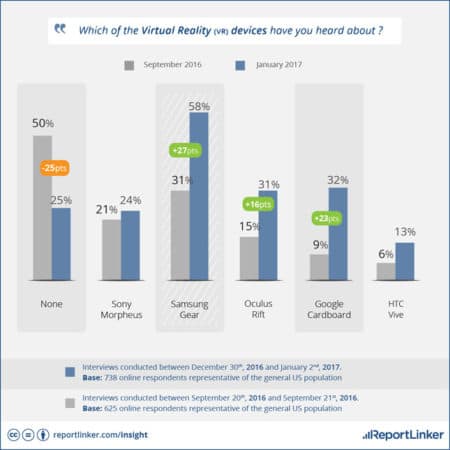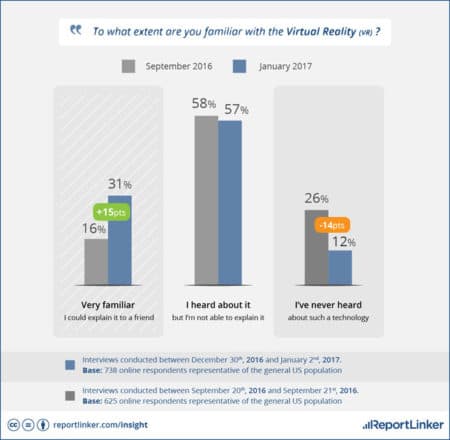For the technology savvy, virtual reality (VR) gear is already well known and understood, including who some of the leaders are in the emerging segment. However, according to a new industry survey study conducted the first week of January, by ReportLinker, when Americans are asked to think about virtual reality headsets (HDMs) over a third of them (35%) say no brand comes to mind.
However, for the 2 out of 3 people who do have a brand in mind, those brands are not necessarily the brands the technology savvy are thinking of. (see image 01)
Virtual Reality Awareness Is Way Up Heading Into 2017
For example, we have written on Architosh about two of the key leaders, Oculus Rift and the HTC Vive, several times, as these two VR platforms have dominated a presence in software booths at AEC industry shows. Yet, the HTC Vive, in particular, is the device that Americans are least familiar with. (see image 01) So clearly there is a disconnect of sorts between professional audiences and more general audiences regarding VR.

01 – Even the sector defining Oculus Rift device pales in awareness recognition compared to the Samsung Gear brand. And the technically highly regarded Vive is dead last.
Regardless, the ReportLinker study clearly indicates awareness of virtual reality technology and the VR headsets are up substantially compared to just one quarter ago. Moreover, Americans say they have a positive outlook and attitude towards VR, indicating growing appreciation for what virtual reality has to offer.
Here are some of the survey study’s findings:
- 83% of Americans say they have a positive attitude toward VR, up from 72% in the prior quarter.
- An extra 20% were able to try VR headsets due to marketing efforts and availability of VR headsets in stores before Christmas.
- 31% say they are familiar with the technology, nearly doubling that percentage from the prior quarter.
- Millennials were early adopters but now older generations have overtaken them and have a more positive attitude toward immersive reality: 84% vs 68%.
- Samsung Gear VR rose the most in brand awareness, with 58% percent mentioning that brand when naming a device they have heard of.
The ReportLinker study clearly shows surging awareness of virtual reality (VR) technology and headsets (see image 02 below). VR marketing was quite strong on television in the United States during the holiday months. Facebook was also making announcements about Oculus Rift last fall.

02 – As we can see from the chart, of those familiar with VR less than 1 and 3 are very familiar with it and can explain it to a friend. Image: ReportLinker.
As the market opens up Samsung leads the way (58% awareness) with Oculus (31%) Rift, Google Cardboard (32%), and HTC Vive (13%) rounding out core leaders. (image 01). However, Americans were also aware of Sony’s Morpheus (24%) but that company only grew 3% in awareness compared to the prior quarter. All of the other brands grew tremendously in brand and device awareness from quarter to quarter. Google Cardboard, in particular, grew the fastest.
MORE: Samsung Gear and HTC Vive Lead VR Survey But Magic Leap?
This leads me to a final point. If the more consumer-oriented VR brands (eg: Samsung, Google, Sony) dominate, what might that do for longer term success for the VR devices that have strong professional industry aspirations like HTC Vive?



Reader Comments
[…] study conducted in the first week of this new year, ReportLinker has stated that virtual reality (VR) devices and technology have shot up in awareness and brand identification by Americans. Nearly 2 out of 3 Americans have now heard of and know […]
Comments are closed.